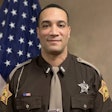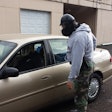Those were heady days, when the excitement of graduating from the police academy and "hitting the streets" was awaited with great anticipation. I remember once during a break from a tactical exercise when my classmates and I huddled around the police vehicle radio and listened in on a shooting in progress. In a few more weeks we would be full-fledged cops and out there answering those same dangerous and adrenaline-filled calls.
Looking back nearly 12 years, I sometimes fantasize: "What if I had a time machine and could go back to the police academy and start my law enforcement career over...knowing what I know now?"
First, let me say that I believe American law enforcement training is consistently the most well rounded and applicable for the situations we face on the street. But there are certain qualifications that need to be met by every recruit, and there is a limited amount of time and resources with which to do it. Academy training is what it is: basic.
There were many things I never learned in the academy that could have helped me on the job. I want to give new officers a chance to use my time machine to think about things they can do to improve their future and their career in law enforcement. It's a lot easier than learning the hard way.
Making Probation
Unfortunately, for some young officers the learning process seems to stop once they graduate from the police academy. Not only has it just begun, but you also need to prepare yourself for more formal and informal training and education over the length of your career.
The academy has been a stressful time of constant testing, both physical and mental. Now the challenge is to maintain your discipline for learning, because you won't have an instructor on your back every time you make a mistake. And now the problems and the bullets are real, not simulated.
Getting through your probationary or initial training period takes a great deal of self-discipline. You most likely took care to maintain your family and personal relationships during your time in the police academy. But now you must prepare your loved ones for new stresses and more demands on your time. This is normal.
Be sure to make time for those who love and support you, and also make time on your days off to study and stay physically fit. Having support from your loved ones, being academically prepared, and being physically fit will help keep you mentally sharp.
There are three things that cover 90 percent of doing well as a new officer (and in life). They are being to work on time (that means early, rookie), being in a proper and well-maintained uniform, and being ready to work. If you can do these three things consistently every day, you are well on your way to a successful career.
However, the remaining 10 percent of career success cannot be discounted. Getting along with your coworkers and supervisors is an important part of making probation and being respected as a new police officer. At this point you should have a solid foundation of good moral and ethical decision making.
You have made it through a background investigation, been hired, and taken an oath to your community to provide fair and equal service to everyone. This means your integrity and honor are at this point undisputed.
Unfortunately, at times there can be a great deal of pressure on young officers to succumb to the "group think" mentality. If you are ever under that pressure, maintain your composure and fall back on your basic instinct of what is right and wrong.
Always remember that your ability to testify in court is based on a history of being trustworthy and truthful. Write your reports based only on what you saw and what you know to be true. In the end, you will be glad you did and you will garner respect for doing the right thing.
Whether right or wrong, people's perception of you will account for a lot. Police stations are places of great personal drama. I have learned it is best, especially as a probationer, to keep your personal and home life private, and to not mix it up too much with work life.
This does not mean you can't attend formal organizational events. But less formal social occasions and behaviors, including late party nights, excessive drinking, and being generally silly, are not conducive to being a good, new police officer who wants to remain a police officer. Focus on being a great police officer first; the camaraderie and esprit de corps of socializing with some of the finest people you will ever know will come later, and it will be even more fun, because you will be welcomed and respected in their ranks.
Career Protection and Enhancement
Organizations lose things. It seems to be a part of their charter. The very first thing that you want to do out of the police academy is to get a big three-ring binder and make a copy of everything that has ever been written by you, about you, or for you. Three-hole punch everything and keep it in that book. At first you may only need one book, but you may later want to break it up into several binders, each labeled for a different category.
What you do not realize now is that if something is not written down, for the purposes of police work it never happened. Years later, in the event you are sued, or medically discharged, or just trying to promote, or go to another department, these records are invaluable, because it is guaranteed that something will be missing from your personnel package.
It is your responsibility to keep your own files. If you read this article and do not take one other thing from it, please do this, because it will help you time and time again, and may even save your job or your future security.
For some reason the complaint and discipline system in most departments remains a mystery until you have a complaint and are walked through the system. That process is about as much fun as riding a bicycle without a seat down a rocky road. I remember my first training officer asking me one day, "Have you received a complaint yet?"
"No," I innocently replied, pretending to be wideeyed, but secretly thinking, "and I won't, because I'm much too smart for that!"
"Don't worry," he said merrily, with an evil glint in his beady eyes. "We'll have you one by the end of the day!" And you know what? I did. Thank you very much, Mr. Training Officer. I now understand the complaint/disciplinary system better than I wanted to.
In all seriousness, do your own research. Ask your training officer about how discipline in your department works, step by step. If your FTO does not know-and he or she might not-ask a representative from your union. This person will be familiar with your agency's disciplinary system and can explain to you your rights during a complaint investigation.
Most importantly, ask the representative what gets officers into trouble and what you can do to mitigate your complaints when you do get them-and you probably will. Another easy way to protect yourself against complaints is to carry a tape recorder (check your department's guidelines on their use) and tape any incident or contact in which there may be a complaint against you. Let your fellow officers know you are taping.
From personal experience, the best way to avoid a complaint is to learn how to talk to people, even the worst form of criminal scum, in a reasonable and respectful manner. To do so is not only professional and correct, but I believe it is also tactically sound. In the end, it is that person who will get a ticket or go to jail, and if you take things to a personal level, you have lost your moral high ground and the tactical advantage that comes from keeping a cool demeanor.
The best officers have learned what I call the "art of the dustoff," which means that after the nastiest fight, the longest foot pursuit, or the occasional mistake of detaining the wrong guy for the right reasons, they can verbally turn things around and "dust" the person off. Some of these individuals go to jail thanking the officers for setting them straight and without making the obligatory complaint. It is an art that every officer should aspire to.
I would hope that all young officers are looking at law enforcement as a professional career and not just a job. In a mere job, people tend to either stay in one place for long periods of time, or meander from assignment to assignment with little thought as to what they wish to achieve. If you want to avoid that, think long term and do these three things: be an expert, have goals, and find a mentor.
Everybody has different interests. The great thing about police work is that there are so many sub-fields where expertise is needed. Find what you like to do and become your department's leading expert on that subject. Attend schools, study on your own, and ask to work cases or assignments that will give you the opportunity to learn about that subject. It makes you a more valuable employee and a better police officer.
Develop some personal career goals, both short and long term. Let's say you want to be a detective over the long term. What have the police officers now in detective assignments done to get there? Maybe they worked vice or gang investigative assignments first. If so, that may be your short-term goal.
In the meantime, you should try to go to those schools that will prepare you to be a vice or gang officer. While you are working patrol, you should be learning everything you can about the local gangs and the vice laws. This is just an example, but you can apply the process to other areas.
My last recommendation on career enhancement is to find a mentor(s). Whatever it is that you decide to do in law enforcement, chances are good that someone else in your department has done it and wants to pass on his or her knowledge.
If you are reading this article, then you obviously do not want to learn everything the hard way. Having a mentor is the best way to avoid that. Let someone else give you the benefit of their career path, their successes, and, maybe most important, their mistakes, because you do not want to repeat those if you can help it.
Law Enforcement As a Profession
It's a trap to think about law enforcement just in terms of what goes on in your jurisdiction. We, as human beings, tend to get caught up in what occurs in our own little world, to the detriment of our agencies and ourselves.
What I wish I learned in the police academy was to look at law enforcement from a strategic point of view. Right now, you are a new officer, but where are you going to be in 20 years, with another possible 10 to go? Today's new patrol officer is going to be the chief of police in the year 2035. Think about that!
What will the state of law enforcement be not only nationwide, but worldwide? After the events of 9/11, I don't think anyone in law enforcement can afford not to take a worldview of political, technological, and sociological events. You might be among the senior police administrators setting law enforcement policy two or three decades from now.
Your agency will provide you with many training and educational opportunities during your career, but you can and must do more. Educational opportunities outside the law enforcement arena are going to be imperative for the New Millennium law enforcement professional.
Higher education, including even doctorate degrees, will be the norm, not the exception. I recommend studying subjects outside the criminal justice field for a more rounded educational experience.
Study what interests you. Possibly the best knowledge you will gain from continuing higher education will come from interaction with professionals outside the criminal justice field. Their insight and perceptions of law enforcement will be critical to successfully policing in a technologically advancing society.
If I can offer one final piece of advice, it would be this: Avoid the tendency, as a new police officer, to focus on just what goes on in and around the immediate vicinity of your police car. You are not just a police officer; now you are a leader in your community.
People of all ages, races, and religions will be looking to you to solve their problems and lead them in the right direction, at points in their life where they cannot make good decisions for themselves. This is a great challenge, but also a wonderful opportunity to make a difference in the world.
Hopefully, this is a central reason behind your becoming a police officer. If you can keep this ideal healthy throughout the life of your career, the police profession will remain personally fulfilling at each stage of the game.













